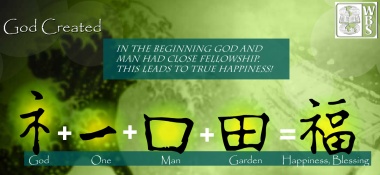I’ve been moving and in the pandemonium have stuffed up the schedule so you might have seen a half-baked version of this yesterday. Here’s the real thing!
A recent episode of the Atheist Experience has made me aware of one of the most ridiculous arguments for Christianity ever. It tries to take apart the meaning of some Chinese characters to show that the ancient Chinese knew the story of Genesis. From this it’s supposed to follow that Genesis is trye (since the Chinese “remember” the story through the structure of their writing system).
Here’s a 10 min video of Matt Dillahunty and Don Baker from the Atheist Experience deal with this ridiculous call on live TV. Their main line of argument is that even if the etymology were true it wouldn’t mean anything, especially since it would contradict the Bible (how exactly I forget). This is a correct response but I want to examine the actual claims. Many evangelical arguments are premised on outright lies, which take advantage of our social-primate brain (which finds it hard to imagine such blatant lying) therefore causing us to assume the premises and look for the fault in the argument itself. This one appears to be just that — blatant lying that should be addressed at the root.
Here’s one of the presentations, making the argument. You can flip through the 30-ish slides pretty quickly but I’d like to focus on just one:

This slide epitomises why the idea is utter bullshit. Firstly, the crude lies. The square-shaped part that says “man” actually means has a primary meaning of “mouth”. Oh, and that window-looking thing actually means “field” not “garden”. I wonder which religious story fits best given these little corrections? Not the garden of Eden story — luckily for my mocking, the Bible specifically says that Adam and Eve were forced to toil the fields AFTER their expulsion from the garden.
But the second, bigger reason why it’s nonsense is that this is not how Chinese characters work. A majority (maybe 75% of characters) are NOT made just combining meanings but have a phonetic component.(usually on the right hand side of a compound character). The phonetic bit is a simpler character with a similar pronunciation to the overall compound character*.
 Let’s take the above character for happiness. Its Zhongwen.com entry shows that the left-hand side can indeed mean a god, but also an omen or something supernatural. However the right side is just the character for abundance. The character is fu (happiness) which is pronounced the same as fu (abundance). The two are somewhat related in meaning but this didn’t have to be: fu (happiness) could have been composed using another phonetic “fu” that means wakalixes for all we care. Indeed, many characters work like this. It does not mean that happiness is somehow related to wakalixes in the minds of ancient Chinese people.
Let’s take the above character for happiness. Its Zhongwen.com entry shows that the left-hand side can indeed mean a god, but also an omen or something supernatural. However the right side is just the character for abundance. The character is fu (happiness) which is pronounced the same as fu (abundance). The two are somewhat related in meaning but this didn’t have to be: fu (happiness) could have been composed using another phonetic “fu” that means wakalixes for all we care. Indeed, many characters work like this. It does not mean that happiness is somehow related to wakalixes in the minds of ancient Chinese people.
Chinese characters (and culture) are often taken to be somehow magical, mystical or mysterious in a newage** way. By those who don’t know much about them of course. Combine that with a desire to prove Christianity right no matter what, and you get drivel of a kind that’s hard to match. And I say this as someone who reads about one stupid thing by Glen Beck per week.
*Or at least, there was a pronunciation similarity at the time the character was invented, there might be a divergence today.
**Pronounced to rhyme with sewage.





0 Comments